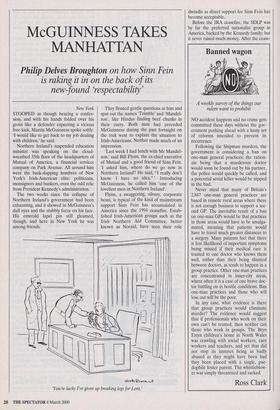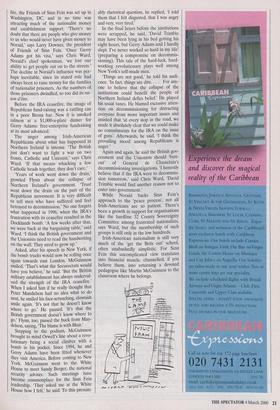McGUINNESS TAKES MANHATTAN
Philip Delves Broughton on how Sinn Fein
is raking it in on the back of its new-found 'respectability'
New York STOOPED as though hearing a confes- sion, and with his hands folded over his groin like a defender expecting a vicious free kick, Martin McGuinness spoke softly. `I would like to get back to my job dealing with children,' he said.
Northern Ireland's suspended education minister was speaking on the cloud- wreathed 35th floor of the headquarters of Mutual of America, a financial services company on Park Avenue. All around him were the back-slapping hombres of New York's Irish-American elite: politicians, monsignors and bankers, even the odd relic from President Kennedy's administration.
The two weeks since the collapse of Northern Ireland's government had been exhausting, and it showed in McGuinness's dull eyes and the stubbly furze on his face. His emerald lapel pin still gleamed, though, and here in New York he was among friends. They floated gentle questions at him and spat out the names 'Trimble' and 'Mandel- son', like Hindus finding beef chunks in their curry. Both men had preceded McGuinness during the past fortnight on the trek west to explain the situation to Irish-Americans. Neither made much of an impression.
`Last week I had lunch with Mr Mandel- son,' said Bill Flynn, the ex-chief executive of Mutual and a good friend of Sinn Fein. `I asked him, where do we go now in Northern Ireland? He said, "I really don't know. I have no idea." ' Introducing McGuinness, he called him 'one of the loveliest men in Northern Ireland'.
Flynn, a swaggering, silvery, corporate beast, is typical of the kind of mainstream support Sinn Fein has accumulated in America since the 1994 ceasefire. Estab- lished Irish-American groups such as the Irish Northern Aid Committee, better known as Noraid, have seen their role `You're lucky I've given up breaking legs for Lent.' dwindle as direct support for Sinn Fein has become acceptable.
Before the IRA ceasefire, the SDLP was by far the preferred nationalist group in America, backed by the Kennedy family; but it never raised much money. After the cease- fire, the Friends of Sinn Fein was set up in Washington, DC, and in no time was attracting much of the nationalist money and establishment support. 'There's no doubt that there are people who give money to us who would never have given money to Noraid,' says Larry Downes, the president of Friends of Sinn Fein. 'Once Gerry Adams got his visa,' says Chris Ward, Noraid's chief spokesman, 'we lost our ability to get people out on to the streets.' The decline in Noraid's influence was per- haps inevitable, since its stated role had always been to raise money for the families of nationalist prisoners. As the numbers of those prisoners dwindled, so too did its rai- son d'être.
Before the IRA ceasefire, the image of Republican fund-raising was a rattling can in a poor Bronx bar. Now it is smoked salmon at a $1,000-a-plate dinner for Gerry Adams: free-enterprise fundraising at its most advanced.
The anger among Irish-American Republicans about what has happened in Northern Ireland is intense. 'The British Just don't want to fight a war on two fronts, Catholic and Unionist,' says Chris Ward. 'If that means whacking a few Catholic heads together, they don't care.' `Years of work went down the drain,' growled Flynn about the collapse of Northern Ireland's government. 'Trust went down the drain on the part of the Republican movement. It is very difficult to tell men who have suffered and feel betrayed to decommission.' No one forgets what happened in 1996, when the IRA's frustration with its ceasefire resulted in the Docklands bomb. 'A few weeks after that, we were back at the bargaining table,' said Ward. 'I think the British government and the Unionists need to read the handwriting on the wall. They need to grow up.' Asked, after his speech in New York, if the bomb trucks would now be rolling once again towards east London, McGuinness smiled. 'That's what the Securocrats would have you believe,' he said. 'But the British military establishment has always underval- ued the strength of the IRA ceasefire.' When I asked him if he really thought that Peter Mandelson had no idea what to do next, he smiled his face-scrunching, clownish smile again. 'It's not that he doesn't know where to go.' He paused. 'It's that the British government doesn't know where to go.' Flynn, too, passed the buck from Man- delson, saying, 'The blame is with Blair.' Stepping to the podium, McGuinness brought to mind Orwell's line about a revo- lutionary being a social climber with a bomb in his pocket. Since 1994, he and Gerry Adams have been feted whenever they visit America. Before coming to New York, McGuinness went to the White House to meet Sandy Berger, the national security adviser. Such meetings have become commonplace for the Sinn Fein leadership. 'They asked me at the White House how I felt,' he said. To this presum- ably rhetorical question, he replied, 'I told them that I felt disgusted, that I was angry and very, very tired.'
In the final hours before the institutions were scrapped, he said, 'David Trimble may have been lying in his bed getting his eight hours, but Gerry Adams and I hardly slept. I've never worked so hard in my life' (preparing a compromise on decommis- sioning). This tale of the hard-luck, hard- working revolutionary plays well among New York's self-made men.
`Things are not good,' he told his audi- ence. 'In fact, things are dire. . . . For any- one to believe that the collapse of the institutions could benefit the people of Northern Ireland defies belief.' He played his usual tunes. He blamed excessive atten- tion on decommissioning for distracting everyone from more important issues and insisted that 'at every stop in the road, we made it absolutely clear that we could make no commitments for the IRA on the issue of guns'. Afterwards, he said, 'I think the prevailing mood among Republicans is anger.'
Again and again, he said the British gov- ernment and the Unionists should 'butt- out' of General de Chastelain's decommissioning investigations. 'I honestly believe that if the IRA were to decommis- sion tomorrow,' said Chris Ward, 'David Trimble would find another reason not to enter into government.'
While Noraid backs Sinn Fein's approach to the 'peace process', not all Irish-Americans are so patient. There's been a growth in support for organisations like the hardline 32 County Sovereignty Committee among frustrated nationalists, says Ward, but the membership of such groups is still only in the low hundreds. Irish-American nationalism is still very much of the 'get the Brits out' school, often unabashedly simplistic. For Sinn Fein this uncomplicated view translates into financial muscle, channelled, if you believe them, into returning a devoted pedagogue like Martin McGuinness to the classroom where he belongs.



































































 Previous page
Previous page